#different sources have different versions
Explore tagged Tumblr posts
Text
Creature Metamorphosis - the Curious Case of the Cahab
I've said it before, and I will testify under oath - the study of mythical creatures is the study of people, not animals.
There is a persistent misconception (mythconception?) that medieval explorers were going out there, seeing weird animals, and, struggling to comprehend them, came up with all kinds of silly stories.
The truth is more complicated. In a lot of cases it's not about actually misconstruing real things, but recopying Classical accounts over and over until the become unrecognizable. In the process, we'll get to explore how language affects creature accounts, how mistakes become real, and how seemingly good-faith additions snowball. And, of course, the importance of primary sources.
Instead of looking at something well-known like dragons or unicorns, let's take a look at the cahab, whose origin was explored in detail by Gauvin et al. (2013).
If you've ever read Rose's Giants, Monsters, and Dragons (and if you read this blog, chances are you're familiar with it), you might have seen this.
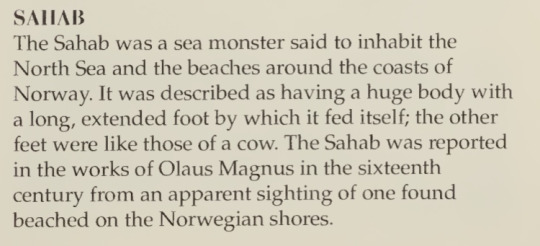
SAHAB The Sahab was a sea monster said to inhabit the North Sea and the beaches around the coasts of Norway. It was described as having a huge body with a long, extended foot by which it fed itself; the other feet were like those of a cow. The Sahab was reported in the works of Olaus Magnus in the sixteenth century from an apparent sighting of one found beached on the Norwegian shores. (Rose, 2000)
Hmm, alright, that's interesting. Sounds like it could be a beached whale? Neat! Where did this story come from? Rose (2000) mentions Olaus Magnus but only cites Barber and Riches (1971). Their entry for this is as follows.

Sahab Described by Olaus Magnus in the sixteenth century as a sea-beast with small cow's feet and a large body found off the Norwegian coast. One long foot was used as a hand for feeding and for self-defence. It was amphibious, breathing in in the water and out in the air. It could also spout like a whale. (Barber & Riches, 1971)
The first thing I'd like to point out is what I like to call "detail drift", or the "stands-to-reason additions", or "snowballing details". A "large body" becomes a "huge body". Details of being amphibious, of spouting are lost. Instead we are told it was based on an "apparent sighting". I mean, stands to reason, right? It makes sense. Surely that was what was behind it.
Where did Barber and Riches (1971) get it from? This one leads directly to a primary source, Olaus Magnus himself. The English translation of Olaus Magnus' Compendious History tells us the following.
There is also another Sea-Monster, called Sahab which hath small feet in respect of its great body, but he hath one long one, which he useth in place of a hand to defend all his parts; and with that he puts meat into his mouth, and digs up grass. His feet are almost gristly, and made like the feet of a Cow or Calf. This Creature swimming in the water breathes, and when he sends forth his breath, it returns into the Ayr, and he casts Water aloft, as Dolphins and Whales do. (Olaus Magnus, 1658)
Makes about as much sense as anything! So clearly silly old Olaus Magnus had seen something bizarre out at sea and explained it the best way he knew how. Because medieval explorers or whatever. Case closed!
... right?
Don't look at how long this post is, keep reading
Something is fishy about this. And I don't mean it as a pun, either. The thing is, Olaus Magnus was more than happy to populate Scandinavia with creatures plagiarized borrowed from other, older authors. And the first clue is in the name.
The French version of Olaus Magnus' work gives it a different name.
Il y a un autre monstre marin, appelé Cahab, lequel a de fort petits piés, pour la proportion du cors... (Olaus Magnus, 1561)
Huh. So it's called Cahab here. Is the English name a typo? It may well be. The Latin text starts like this.
Est & aliud monstru marinu secundu Alber. lib. XXIII l. de animal. Cahab dictum, pedes parvos habens respectu magnitudinis corporis sui... (Olaus Magnus, 1555)
Yeah that tracks, so it is Cahab in the original too and
wait what
Est & aliud monstru marinu secundu Alber. lib. XXIII l. de animal.
Are you saying the English and French translations literally cut out the part where he tells us where he got this from???????
See what I mean? There are layers to this.
So, following Gauvin et al. (2013), who track this bizarre transformation, Olaus Magnus never did see or claimed to see a cahab. He merely borrowed it from Albertus Magnus, who had this to say.
Cahab animal marinum esse perhibetur parvos habens pedes respectu corporis sui... (Albertus Magnus, 1920)
But the trail isn't getting cold yet. Gauvin et al. (2013) indicate that Albertus Magnus got this from Thomas de Cantimpré, who instead refers to the caab.
Caab animal marinum est, ut dicit Aristotiles, parvos habens pedes respectu corporis sui, quod utique magnum est... (Cantimpré, 1280)
In other words, "Caab is a sea animal, as says Aristotle, whose legs are small in proportion to its body, which is huge”. Once again, a citation has been lost by someone repeating it.
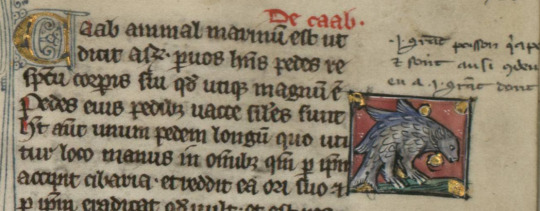
The caab in Cantimpré's Liber de Natura Rerum, accessed here.
So where did this thing comes from? He does say it's from Aristotle, but Aristotle doesn't mention caabs, does he?
Would you believe an elephant?
As Gauvin et al. (2013) explain, Cantimpré is the origin point of the caab/cahab/sahab, and it originated in a misreading of Aristotle.
Specifically, a misreading of a Latin translation of Aristotle by Michael Scot, which had been translated from an Arabic translation of Aristotle from the original Greek.
Now! Listen carefully Bond...
Scot retained Arabic words in his translation (maybe he didn't know what they meant? Or thought they just looked better? Can't blame him). In this case:
et habet duo cahab parva respect magnitudinis corporis sui (cited in Gauvin et al. (2013))
He's saying, in the description of the elephant, that it has two "cahab" that are short compared to the rest of its body. Cahab is a transliteration of كعب, which is a bone in the ankle. So in other words, elephants have small ankle bones.
Except!
When Cantimpré read this, according to Gauvin et al. (2013), he did not recognize the word cahab. Instead, he interpreted it as the subject of the verb "habet". So instead of "and has two ankle bones that are small", it became "and the caab has... feet I guess? That are small".
Then he combined previous details about the elephant - it has a trunk that it uses to spout water! - to create his caab. Which then got transplanted into the ocean around Norway. Somehow.
And there you have it, a supposed "apparent sighting" of a "beached" animal that in reality is a bunch of snowballing translation errors. Olaus Magnus never saw one, and neither did anyone else.

Of course, when I painted my cahab, I had to make it as much like a floppy elephant as possible. :3
References
Aristotle, Cresswell, R. trans. (1862) Aristotle’s History of Animals. Henry G. Bohn, London.
Barber, R. and Riches, A. (1971) A Dictionary of Fabulous Beasts. The Boydell Press, Ipswich.
de Cantimpré, T. (1280) Liber de natura rerum. Bibliothèque municipale de Valenciennes.
Cuba, J. (1539) Le iardin de santé. Philippe le Noir, Paris.
Gauvin, B.; Jacquemard, C.; and Lucas-Avenel, M. (2013) L’auctoritas de Thomas de Cantimpré en matière ichtyologique (Vincent de Beauvais, Albert le Grand, l’Hortus sanitatis). Kentron, 29, pp. 69-108.
Magnus, A. (1920) De Animalibus Libri XXVI. Aschendorffschen Verlagbuchhandlung, Münster.
Magnus, O. (1555) Historia de gentibus septentrionalibus. Giovanni M. Viotto, Rome.
Magnus, O. (1561) Histoire des pays septentrionaus. Christophle Plantin, Antwerp.
Magnus, O. (1658) A compendious history of the Goths, Swedes, and Vandals, and other Northern nations. J. Streater, London.
Rose, C. (2000) Giants, Monsters, and Dragons. W. W. Norton and Co., New York.
Unknown. (1538) Ortus Sanitatis. Joannes de Cereto de Tridino.
#creatures#mythical creatures#monsters#sea monsters#cahab#caab#sahab#ankles#aristotle#elephants#olaus magnus#etymology#marine biology#<- I gueeeessss?
59 notes
·
View notes
Note
Do you know if this guy just hates Camille or is any of this is true? Like he was "so little respected" and "never entrusted with duties of any consequence"?

I'm reading "The Twelve Who Ruled" by R.R. Palmer because it got recommended a lot on reddit, but this guy seems kind of mean. He refers to Camille's writings as "childish pretentions to learning" & even goes out of his way to say how he didn't die "with fortitude" like everyone else.


His Wikipedia article says he was begging for his wife's life, which paints a totally different picture. But I'm having trouble getting access to a lot of the books that I see referenced, and I don't know if that's a romanticized version or if Palmer's is slanted.
Camille's last letter got its hooks into my brain and I can't stop chasing down his story! People are complicated & I love that he might've been an awkward little weirdo, but also I don't know that the sources I have available are particularly unbiased.
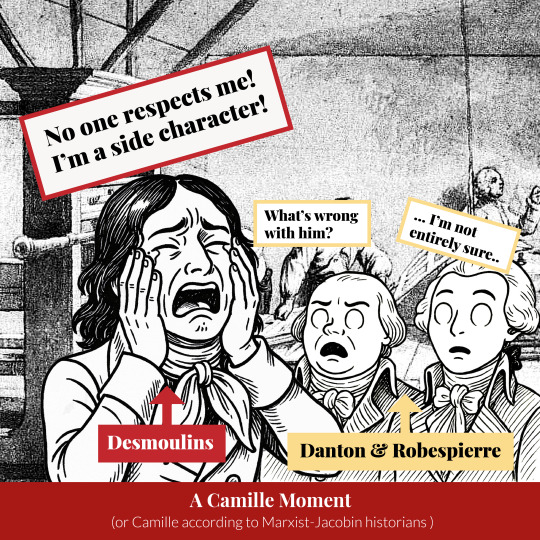
Camille Desmoulins: A kind of child in politics?
First of all, I have to say I adore this question. Genuinely. Thank you, @secondjulia, for sending it in.
Why do I love it? Because it lets me say the obvious thing that somehow still needs saying: Camille Desmoulins, like everyone else in the 18th century, was a person. Not a metaphor. Not a cardboard cut-out. Not a tragic hero cooked up by a novelist. An actual human being. Loved by some, ignored by many, hated by others.
I’ve said this before, but it bears repeating: historical figures were people. They sulked, lied, procrastinated, wept, and occasionally changed their minds.
And so, as with Robespierre, Danton, Saint-Just and the rest, our understanding of Camille depends far more on who’s writing than on Camille himself. The sources, primary or not, often reveal more about their authors than their subjects.
So what about Palmer? I like Twelve Who Ruled. It’s a sharp piece of scholarship. Palmer had a clear aim: to explain the Committee of Public Safety. And that’s what he did. The book is about them, told from their vantage point.
Palmer reconstructed Year II from the Committee’s outgoing paperwork and their own letters. In other words, he built his narrative from the records of the people who had Desmoulins arrested. Naturally, their prejudices bled through. When Saint-Just called him a Danton’s vain syncopath (1), Palmer more or less nods along and copies it out.
So, was Camille really a political child whose death meant nothing? As always with history, it depends who you ask.
A Short (and simplified) overview on Historiography of Camille Desmoulins
Nineteenth-century French historians such as Michelet, Lamartine, Thiers and Claretie, cast Desmoulins as a central (if impetuous) voice of 1789: the spark that roused Paris, an eloquent pamphleteer elected to the Convention, and a tragic victim of the Revolution’s tendency to eat its own children.
Twentieth-century assessments split. The Marxist-Jacobin line, via Mathiez and Lefebvre, paints Camille as vain, erratic and unserious. In this respect, Palmer follows this view, no surprise, since he admired Lefebvre and borrowed from his intellectual conclusions. And Palmer, after all, wasn’t writing a book on Desmoulins.
Revisionist historians , from J. M. Thompson to François Furet, pushed back, reframing Camille as a voice of early dissent, warning of the Republic’s descent into purges and paranoia.
Since the 1980s, press historians have looked more closely at his journalism. Révolutions de France et de Brabant, Le Vieux Cordelier. They have found serious contributions to republican thought and critiques of the Terror.
Today, writers like Hervé Leuwers depict him as a thoughtful Enlightenment man of letters, a proto-republican, and a principled journalist whose private letters radiate clarity, courage and, and, above all, love for his family.
Palmer’s charges against Camille
So, given that the historiography is anything but settled, let’s examine what Palmer actually accuses him of:
Political immaturity and irrelevance. Desmoulins was "a kind of child in politics". So unimportant that he was never given any serious responsibility.
Mock-intellectualism and distortion. He had “childish pretensions to learning” and twisted facts for the Indulgents’ cause.
Cowardice at death. He alone struggled at the scaffold.
Cruel hypocrisy. He was cruel and mocked others for dying badly but couldn’t manage composure himself.
Undue familiarity. People called him “Camille”, and that, somehow, is evidence of his unseriousness.
So, with all the charges laid out, let’s get into it
1. Political immaturity and irrelevance.
This is nonsense.
Desmoulins wasn’t just writing pamphlets in cafés, the 18th-century equivalent of a keyboard warrior. He was elected Deputy for Paris from 1792 to 1794. Convention transcripts show him speaking at the king’s trial and submitting official opinions on the veto, the royal succession, and the state of army morale.
He sat briefly on the Commission of Public Safety (March 1793) (2) and then on the Committee of War, submitting papers on military supply and recruitment. In February 1793, he alone was tasked with inspecting Didot’s paper mill (3), which was vital to revolutionary printing.
Danton and Robespierre also used him strategically. They gave him documents and political cover to attack the Hébertists in Le Vieux Cordelier (4). Even Palmer concedes that his Histoire des Brissotins (5) was so influential that entire pages were quoted in the Girondins’ indictment.
So no, he wasn’t kept out of power because no one respected him. The Committee turned on him when he demanded clemency, not because they thought he was harmless, but because they knew he wasn’t. They understood perfectly well that his words could shift public mood, that he could cause real trouble. If he were just Danton’s decorative shadow, there’d have been no need to silence him. But they arrested him, too. That tells you exactly how seriously they took him.
2. Mock-intellectualism and distortion
Camille’s notebooks are still in the Bibliothèque Thiers. Marginalia in Cicero, Tacitus, Livy, Rousseau. Not bad for a political child…
In La France libre he coined “liberté, égalité, fraternité”. In Révolutions de France et de Brabant, he cites Grotius and Vattel to sketch a law of nations. I don’t know about you, but I wouldn’t call that childish. When I was a child, I was reading Harry Potter, not Grotius.
Palmer accuses Le Vieux Cordelier of distortion. But what did Camille actually write? He warned of secret denunciations, lawless arrests, and the slow crawl toward dictatorship. Robespierre himself approved the first three issues until Camille turned the critique on the Committee itself and dared to demand clemency. That was the line. Truth was acceptable, so long as it didn’t threaten the precarious stability of the revolutionary government.
And let’s be clear. I’m not in the “Robespierre was a tyrant” camp. He wasn’t. Not even a little bit. But Year II was an unholy mess, and Camille was right to say so.
3. Cowardice at death.
First of all, I don’t know about you, but if I were about to have my head cut off for writing a few pamphlets, I’d be a little miffed too. But let’s set that aside.
Did Camille lose his composure on the scaffold? Yes, he did. Eyewitnesses like Beffroy de Reigny (6) saw him in the tumbrel, shirt torn, laughing convulsively, looking unhinged. He did not cut the calm figure Danton did beside him.
But was he truly afraid of death itself? Perhaps. He had every reason to be. That would have been natural, even expected. Yet his final letters suggest something else. In one of them, he wrote: “My head rests on the pillow of my writings... they all breathe philanthropy.” (7) He knew why he was being killed, and he accepted it.
So why the breakdown? In court, when Fouquier-Tinville (8) dragged Lucile’s name into it, Camille lost control. “They want to murder my wife too!” (9) he shouted, and had to be forced down. Perhaps his despair was not for himself, but for her. For the child they had. For the family he knew he was leaving behind, and feared might follow him to the scaffold.
Palmer was writing in an era that still venerated stoicism as a masculine ideal. Men were expected to die well, quietly, without emotion. It is a ridiculous standard. Always has been. Men, 18th-century ones included, are allowed to be human. A thirty-four-year-old husband and father, facing a violent end and the likely execution of his wife, is allowed a moment of collapse.
Yes, Camille broke down physically. So did Fabre d’Églantine (10) and Chabot (11), though Palmer leaves them out. But courage should be measured by your posture in the cart. It should be measured by whether you stood by your words. Camille did. He never disowned what he wrote. He died with it, and with all the fear that came with being someone who loved deeply.
4. Cruel hypocrisy
Camille Desmoulins was a brilliant journalist. In my view, the best of the Revolution. His style was elegant, funny, and direct. He picked his topics shrewdly and knew exactly what would catch the public’s attention. At times, he was cruel, but cruelty was the currency of the era. No one ever accused Marat or Hébert of restraint…
He was a masterful satirist. Early in the Revolution, he mocked the high and mighty with gusto. In Révolutions de France et de Brabant, he took aim even at the executioner Sanson (12) and earned himself a libel suit. In Discours de la lanterne, he justified the lynching of aristocrats. The title alone was a nod to the violent street slogan “à la lanterne” (13). He made his position very clear.
And he was hardly an outlier. Violent rhetoric was everywhere. It was the daily fare of the press, speeches, and yes, even the national motto. “Liberté, égalité, fraternité ou la mort.” (14) This was a very intense time.
That said, by the time Year II descended into madness, Camille had changed his tune.
In Vieux Cordelier no. III, he called for clemency and due process, an unpopular stance in the Convention, though wildly popular in the streets. The issue sold out across Paris. Robespierre had to speak on his behalf at the Jacobins just to stop his peers from tearing him apart.
By the end of 1793, Camille had become a humanist. He had moved from vengeance to justice. He had seen what violence looked like when taken to its logical end. That was not hypocrisy. It was growth.
5. Undue familiarity
This one barely deserves a rebuttal. Yes, people called him “Camille” instead of “Desmoulins”. In the West, they also called La Rochejaquelein “Monsieur Henri”, and still do. It did not make him any less of a general. It was not disrespect. It was affection. Perhaps even popularity. Was it a bit infantilising? Maybe. But that is hardly an indictment.
Conclusion
Every one of Palmer’s criticisms, whether it be childishness, flippancy, uselessness, shallow intellect, fear, hypocrisy, or lack of seriousness, collapses under scrutiny. Read the transcripts. Read the pamphlets, the letters, the modern biographies. You will not find a clown. You will find a sharp, impassioned writer. Not a child, but a man whose conscience could no longer stomach what the Revolution had become.
Palmer was writing during the Second World War. He valued discipline, executive clarity, and the capacity to act decisively. Desmoulins, a polemicist and tribune rather than a minister, naturally fell outside Palmer’s pantheon.
So, who was Camille? He was a man. He had friends. He was loved.
That may not have counted for much in Palmer’s eyes, but it was precisely what made Camille so effective. He moved people. He mattered to them. He made them listen.
Robespierre put it best during one of the most memorable exchanges between them. Camille, instead of keeping quiet and letting Robespierre speak for him, insisted on defending his own writings. Robespierre, exasperated, said: "Learn, Camille, that if you were not Camille, we might not be so indulgent with you." (15)
That tells you everything you need to know.
Notes
(1) Saint-Just had a busy spring in 1794. As the Committee of Public Safety’s mouthpiece, he was repeatedly sent to the Convention to justify the arrests of Danton, Desmoulins, and the rest of the Indulgents. On 31 March, he made it perfectly clear what he thought of Camille. In his view, Desmoulins was a vain little man, too foolish to think for himself and too dazzled by Danton to notice he was being used.
(2) Not to be confused with the more infamous Committee of Public Safety. Desmoulins briefly served on the Commission of Public Safety in March 1793. This commission was established to protect the young Republic from internal and external threats. It would eventually evolve into the Committee we now know.
(3) The Didot family were renowned French printers and typographers. Their paper mill was instrumental in producing the high-quality paper used for revolutionary materials, including assignats (paper money).
(4) Le Vieux Cordelier was the last journal founded by Desmoulins, launched in December 1793 to attack the radical Hébertists. It ran for seven issues, the last of which appeared posthumously.
(5) In May 1793, Desmoulins published Histoire des Brissotins, a pamphlet attacking the Girondins, particularly Jacques Pierre Brissot. It portrayed them as enemies of the Revolution, helping to discredit them and strengthen the Montagnards’ hold on power.
(6) Louis Abel Beffroy de Reigny, known by the pseudonym "Cousin Jacques", was a French dramatist and journalist. He is best remembered for his satirical commentary during the Revolution.
(7) Original French: "Je repose ma tête calmement sur l'oreiller de mes écrits... tous respirent la philanthropie."
(8) Antoine Quentin Fouquier-Tinville served as the public prosecutor in Paris during 1793–1794. He was responsible for leading many of the key trials of the Terror, including those of Desmoulins, Danton, and Robespierre.
(9) Original French: "Ils veulent encore assassiner ma femme !".
(10) Philippe-François-Nazaire Fabre, known as Fabre d’Églantine, was a French actor, playwright, and politician. He helped create the Revolutionary calendar and was a close ally of Danton. Accused (rightly) of corruption, he was executed alongside Desmoulins in April 1794.
(11) François Chabot was a former Capuchin friar who became a radical Jacobin and Convention deputy. He was implicated in financial scandals and executed with Danton and Desmoulins in April 1794.
(12) Charles-Henri Sanson was the official executioner of Paris throughout the Revolution. Desmoulins satirised him, claiming he dined with aristocrats , a jab that earned him a libel suit.
(13) The phrase “à la lanterne” was a revolutionary slogan calling for perceived enemies to be hanged from street lamps.
(14) The motto of the First Republic was "Liberté, égalité, fraternité ou la mort" or "Liberty, equality, fraternity or death."
(15) Original French: "Apprends, Camille, que si tu n'étais pas Camille, on pourrait bien ne pas avoir autant d’indulgence pour toi."
#frev#french revolution#camille desmoulins#history#robespierre#thank you for the question#amateurvoltaire's essay ramblings
69 notes
·
View notes
Text
Another fantastic but heartbreaking part of Expedition 33 is the way the narrative frames the passing of the painted Dessendre family and Simon. For us as players and for the most of the Expedition they are just obstacles in our way to the end. But not for all, especially not for Verso.
When it comes to Renoir, killing him is a necessary step. He, a painted creation himself, stands between them and the Expedition's goal. Getting rid of him is exhausting but joyous - for all but Verso. Mealle is confused, she is finding her new powers while a version of her brother is loosing his father. The next time Verso will see Renoir it will be a father that doesn't even acknowledge him being there, it won't really be HIS father.
We have the Paintress herself, a grieving mother that needs to be reminded that some of her children are still alive. That seems to blame her youngest for a death of her brother enough to punish different versions of her (she lets Mealle have Gustave. And yet she hasn't forgiven her. She sets her on fire just so Verso can again smother it with his own body). Once again, it's a joyous occasion for the Expedition that leaves Verso on his knees and leaves him to face the consequences of his choice to save HIS mother.
Then Alicia, who longs to be free from the painted world created by a mother who could have given her a voice and could have healed her but decided not to. Here most of the companions aren't as emotionally connected to this loss, leaving Verso and Mealle. Mealle who sees it as mercy, as fulfilling her other-self wishes. Alicia freezes time just so all versions of this one girl can spent some time alone. And then when the time starts all Verso can see is HIS sister's death at the hand of this healthier version of her.
We also have Clea, poor Clea that has become a source of the monsters that destroy her world. Taken from her family and repainted by another version of herself, up until her brother finds her and helps her gain enough control to kill herself. The Expedition hangs back during her final moments, having won against the source of their misery or maybe giving Verso a moment. This death wasn't a necessary step but would always happen as long as he reaches his goal. Only now he has to witness it, watch the only living member of HIS family chose death, just like Alicia did. Just as he will want to in the end.
And lastly, Simon. Not a direct member of the family as far as we know, but Clea's partner and someone close enough to Verso. Just like Verso he had come into contact with the Painters but for him Clea, the painted Clea, was the most important one. He was tricked by Painter!Clea and lost his beloved, only to be locked in the fight against Painter!Renoir to help in keeping him from destroying the painted world. We don't need to kill him - he's no threat, he will die just like everyone else. But when we do he passes his sword to Verso, the only one who once again recognizes him and bears the burden of killing him. Does he think Verso will use this sword to keep his sister safe? Is he passing along the duty to fight against the Painter!Renoir without knowing that his sword will bring the end to their world? Verso looks back at his companions before accepting the sword but they neither know Simon nor do they know the fate awaiting them once Verso gets the ending he wants.
After all of this I'm not surprised Verso wants it all to end. All of the Expeditioners have lost someone. Only, the latter two parts of the game see us killing each member of his family. Even if he had started with this goal of rescuing his mother, it feels like the goal shifted toward the end. He too just wants it all to stop.
#I have so many thoughts about this game#about how Maelle has been acting in a childish (selfish) way that is befitting her age up until we realize she is a god of that world#or how those different interpretations of who is real and who is not shaped Dessendre's attitutes toward painted people#how i think that this game does so many wonderful twists on who is the main character: Gustave->Verso->Mealle->Verso#how by ignoring Lune and Sciel toward the end it shows Mealle's own focus shifting from who her friends are to the concept of keeping them#expedition 33#clair obscur: expedition 33#expedition 33 spoilers#clair obscur spoilers#clair obscur verso#clair obscur maelle
39 notes
·
View notes
Text
Pronouncing ん
So far, we’ve looked at and talked about ALL of the Hiragana characters. Hooray! 👍🏾 👏🏾
Now, I’d like to bring attention to a select few of the characters we’ve looked at:
ゃ、ゅ、ょ、っ、ぁ、ぃ、ぅ、ぇ、ぉ、and ー
What do these characters have in common??
The answer is that they don’t actually make any sounds by themselves. They all depend on whatever character appears before them.
As it turns out, ん belongs in this group as well! In fact, the pronunciation of the ん character is so special that it has its own word - はつおん. (はつおん when written as 発音 just means “pronunciation” but when written as 撥音 means “the pronunciation of the ん character”) Even Japanese native speakers may not be aware of this, but the pronunciation of ん changes depending on the character that comes before it! 😱
I’ve chosen 3 different ways that native speakers pronounce ん so let’s take a look a them, one by one.
1) The “M” Sound [m]

The sound combination of “n” with any of those other sounds is actually inconvenient for your mouth to produce. Of course it is possible, but in order for an easier pronunciation and to save time, your mouth basically changes the “n” sound to get ready for the next sound. This results in the sound becoming the “m” sound. Let’s look at an example:
あんまり means “not much” or “not really”. If you pronounced each sound for a small child to repeat, you would say “a-n-ma-ri”. When you say this word in a sentence though, it’s pronounced as “am-mari”.
Here is another example with a famous train station in Tōkyō - しんばし:

See how the ん is written as an “m” in the romaji spelling?
Here are some more examples:
こんばんは = good evening (pronounced as kom-ban-wa)* じゅんび = preparation (pronounced as jum-bi) ぜんぶ = all, everything (pronounced as zem-bu) ————- えんぴつ = pencil (pronounced as em-pitsu) さんぽ = a walk, a stroll (pronounced as sam-po)
Here is a great video from a channel called ひろのはつおん with him pronouncing ん as the “m” sound.
2) The ”NG” Sound [ŋ]

Our next pronunciation of ん is as the “NG” sound, like in the English word “sing”. If you focus on how you say the words “sink” and “sing” you’ll notice that these words both have the “ng” sound.
Some Japanese examples are:
げんかん = entrance or entryway (pronounced as “geng-kan”) げんき = lively, energetic (pronounced as “geng-ki”) てんき = the weather, good weather (pronounced as “teng-ki”) でんき = electricity (pronounced as “deng-ki”) べんきょう = study (pronounced as “beng-kyō”) ゆうびんきょく = post office (pronounced as “yū-bing-kyoku”) ぎんこう = a bank (pronounced as “ging-kō”) おんがく = music (pronounced as “ong-gaku”) こんげつ = this month (pronounced as “kong-getsu“) ばんごう = (pronounced as “bang-gō“)
Here is a video with ん pronounced as the “ng” sound.
3) The Nasalized Vowel Sound [Ṽ]

This pronunciation of ん is a bit tricky. When it comes before any of those characters, it is basically pronounced as a more nasalized version of the “n” sound. Try humming the “n” sound from your nose and you will get this version of ん.
Now, take a look at the next 3 words:
げんいん げにん (be careful!) げいいん (ambiguous)
げんいん means “cause” or “original source”. It’s very important that you pronounce the ん separately from the い. If you pronounce it as “ge-nin” (げにん) you are saying “a low-rank person” or “a peasant”! If you pronounce it as “gei-in” (げいいん) the meaning becomes “over drinking”!
“Over drinking” is ONLY pronounced as げいいん. Interestingly though, because the pronunciation of げんいん and げいいん are so close, BOTH have become associated with the “cause” meaning. This leads to even native speakers getting confused sometimes!
Here are 2 more words where the first pronunciation has evolved into 2 choices for the same meaning:
ふんいき (now ふいんき is also possible) = vibe or atmosphere はんおう (now はんのう is also possible) = response, replying
The next set of words are all pronounced with the nasalized vowel sound:
あんしん = peace of mind, relief ぜんしん = whole body でんしゃ = a train こんしゅう = this week ぶんしょう = sentences せんせい = teacher, doctor, master じんせい = one’s life せんそう = war —————— きんようび = Friday —————— でんわ = telephone, or a telephone call ほん を = a book, or books (as the direct object of an action)
Here is a video where you can hear the nasalized ん in action.
Conclusion
There you have it! There are actually more pronunciations of ん** but we won’t get into them here. I believe that if you are simply aware of the 3 pronunciations we talked about in this post, you will be more than on your way to excellent spoken Japanese. Also, it’s important to train your ears to hear the subtle differences in these pronunciations. Native speakers are often not aware of what they are saying but they sure do pick up on mistakes or variations quickly! No worries though; this is part of the learning experience!
See you next time!
Rice & Peace,
– AL (アル)
👋🏾
*は is pronounced as “ha” when it is just a Hiragana character. However in this case, it is a particle - which is a Japanese part of speech. When は is a particle, it’s pronounced as “wa”
** Some sites say that there are 7 different pronunciations while others say that the number is 6. Here are ひろのはつおん’s videos on the other pronunciations of ん:
when not followed by any sound when followed by t, d or n (but not ち、じ、or に) when followed by ち、じ、or に when followed by z or r
#hiragana#learn hiragana#pronunciation#japanese pronunciation#study blr#language blr#日本語の勉強#日本語#日本語勉強#japanese#langblr#japanese language#learn japanese#language study
27 notes
·
View notes
Note
https://www.tumblr.com/darcyolsson/784985295714238464?source=share
Please, I don't know jack about tswift or tswift's music... what's the tea 👀👀👀
she got the rights to her masters back! basically a few years ago, the rights to the master recordings of her first 6 albums were sold by the person who owns the record label she was originally signed to (scott borchetta) and she was never given an option at any point to buy them herself, even though she'd been wanting to for years. what made matters worse is that the person who he sold them to was someone who she's privately and professionally had a lot of trouble with in the past and overall does not like (scott borchetta, who used to be the manager of many big names including ariana grande, demi lovato, and idina menzel, all of which left his management in quick succession a few years later. make of that what you will). she also made it clear that borchetta was very much aware of her feelings towards braun, so it was just a massive betrayal to her all around. she knew the rights would get sold eventually, but it being braun who they were sold specifically is what made it awful.
I assume you know about the taylors versions, but if you dont: basically taylor hated the idea of 1. not owning her work and 2. someone who she hates profiting off it (she was still making some money from her og recordings, just not as much as she would have and every time she did he got money too). because of this she decided to rerecord her entire back catalog, and 4 out of 6 of those albums have been released (all the albums she made under her new label have been fully owned by her from the start). the rights to those original 6 albums eventually got sold by borchetta to a different company and taylor announced today they allowed her to buy them back, making her own everything again.
the post refers to the endless (well, until now!) swiftie debate about the ethics of listening to the og recordings. ofc the general consensus was that you "should" listen to the taylors versions, but a lot of people are attached to the og recordings/thought the rerecording didn't always capture the song in the same way/etc.
people LOVED arguing about this of course. it was a lot of "if you support that evil man by streaming 20 seconds of shake it off stolen version taylor hates you and you need to die" (it's truly not that deep) countered by "well they're both evil billionaires so it doesnt even matter!!!!" (it's more about owning your lifes work than money) I think most people were quite normal about it and a lot of the discourse around it was quite nuanced but ofc the most radical opinions got the most attention and it got exhausting quite fast. fortunately it went on for 4 years after that
anyway it's all over now bc she got them back <3 i'm genuinely very happy for her, the fact that one of the biggest artists in the world had this much trouble just getting to own her music is actually diabolical and I'm really glad she took the opportunity her to turn this into a bigger discussion on how artists are treated in the industry. now excuse me while I go stream style (not taylors version)
23 notes
·
View notes
Text
Wanted to make a shitpost for Pride Month, and It includes the Villain AU version of Newton (as you can see lmao) so I thought 'Maybe I should just introduce him to give context'

This is SuperNova, he technically is in-charge of the AniMasks. Nova possesses the power crystals that the AniMasks uses, so he can pretty much force a detransformation on them if he wanted to.

He doesn't have all his powers. Almost all of his asteroids were stolen, leaving him with one. Which lets him transform into his outfit, connect with space, and hover slightly.
SuperNova's orders are simple– the AniMasks will search for different strong power sources and make it bleed into the city. He wants Tarabiscoville to have the highest concentration of power, that even beings from far away galaxies can sense it. Why? Because he hopes to lure the entity who stole his asteroids. The concentration of power that the city will radiate will bound to attract power hungry characters into Earth.
Other than that, he pretty much just keeps to the shadows, monitoring and observing the release of power or movement of space. He lets the AniMasks do pretty much whatever they want, as long as they continue looking for sources of power/energy.
Oh and design-wise, his black hole color palette was an accident 🙏 In this AU I think I've made the characters' ages around 11-13 in season 1 and 14-16 by season 6. Some of these things might change, it really depends on how I feel about things lmao
#fanart#pj masks#pj masks power heroes#pj masks fanart#pj masks au#pj masks villains au#pj masks au night panther#pj masks au supernova
28 notes
·
View notes
Text
Hi, sorry for using your tags, but I actually think this is such an interesting topic ^^

So the easy answer is of course; I like small fanon HC and the Silm has so much angst I can create some fluff as a treat
The longer answer is;
It is important to know YOU as the reader decide what is canon and what isn´t in Tolkien´s books.
In Morgoth´s ring Míriel is released after Finwë´s death, about the same time we are told Indis, who loved Fingolfin most in some versions, left Finwë after Fëanor´s first rebellion (a long time before Finwë´s death). - in this version, Finwë meets Indis after Míriel´s death simply because they are on the same staircase and both are mourning. Míriel and Indis´ friendship before Míriel´s death is hinted at here, also they both made the great journey they likely meet at some point.
In LaCAtE we are told elves have to give part of their soul to their children, and we know Míriel gave more than most elvers, which is likely a bit part of her death - which came after having slept in for a few years (in some versions she is still sleeping btw - I also think it´s slightly funny that Namo told her to please tell Finwë no and she just starred him down without a word, she was likely named Fíriel (she that sighed) after that...).
Finwë, when wanting to remarry, goes to Mandos where he asks for Míriel´s approval, which is given. This is important to know that while most like the fanon version where Fëanor is a child, Fëanor was in fact, at the youngest, an older teenager. *The Shibboleth of Fëanor
And even if looking over all this, I don´t think we should take their friendship from this, no matter how you go around it I think most agree Finwë could have handled this situation a bit... better... and yes Indis is said to have loved Finwë which I doubt was a secret from Míriel with the way they are described in LaCAtE, but again some things we all read different to fit with our own experience and such :)
SO: no condemning anyone to death was made in the Silm, and no one slept with their best friend´s ex without permission ;)
Sources:
Indis leaving Finwë pretty quickly is said in Morgoth´s ring; Laws and Customs Among the Eldar page 252-253
+ great quote I just love:
And Finwë said to Vairë: Dost thou hear the prayer and desire of Miriel [to return to life]? Why will Mandos refuse this redress of her griefs, that her being may not be void and without avail? Behold! I instead will abide with Mandos for ever, and so make amends. For surely, if I remain unhoused, and forgo life in Arda, then his Doom will be inviolate.” “But above all her heart now yearns for the halls of Ingwë and the peace of the Vanyar, far from the strife of the Noldor. Little comfort should I bring her, if I returned; and the lordship of the Noldor hath passed to my sons.”
Also funny thing, Indis was Míriel in the first version and only late got renamed Míriel and then Indis of the Vanya came.
Míriel & Indis

They were best friends. We all agree on that, right??
COMMISSIONS OPEN - Support me on Ko-Fi; early access drawings + WIP + COMM discounts
#i like to think of them as best friends but friends work for me too but i dont think they didnt like each other#they where found of each other and you yourself can deside how#again sorry for using your tags i just really like this topic#just a reblog#tolkien meta#meta post
374 notes
·
View notes
Text
(Note: I had to remove one of the reference images because Tumblr got picky and made my post "sensitive content." It doesn't affect the rest of the post, so I hope you like it).
So, maybe I just posted something yesterday thinking it would take longer, but I just finished it and got really excited, so…
Here you go. :)
(The images are in Spanish [I was a bit lazy to make English versions], but I'll leave the translations under each one)
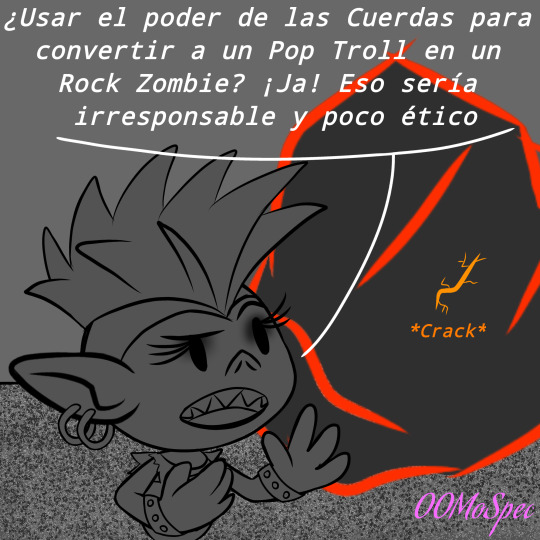
Queen Barb: "Using the power of the Strings to turn a Pop Troll into a Rock Zombie? Ha! That would be irresponsible and unethical."
Rock behind her: *Crack*
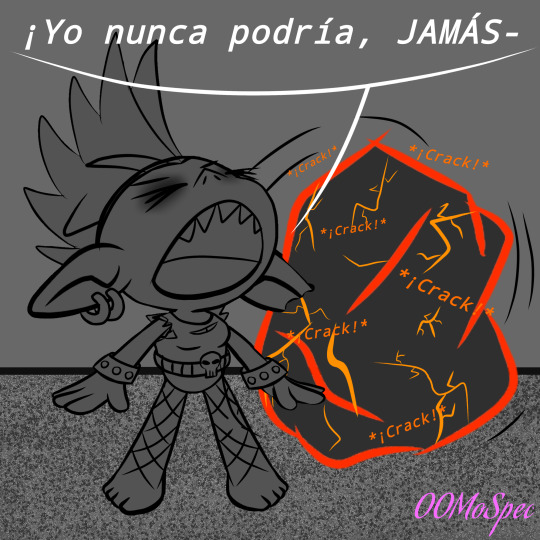
Queen Barb: "I could never, EVER-"
Rock: *Cracks more as she speaks*
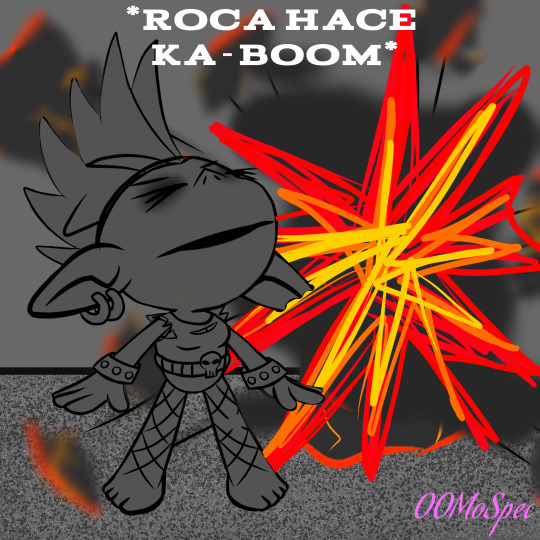
Rock: *goes Ka-boom*
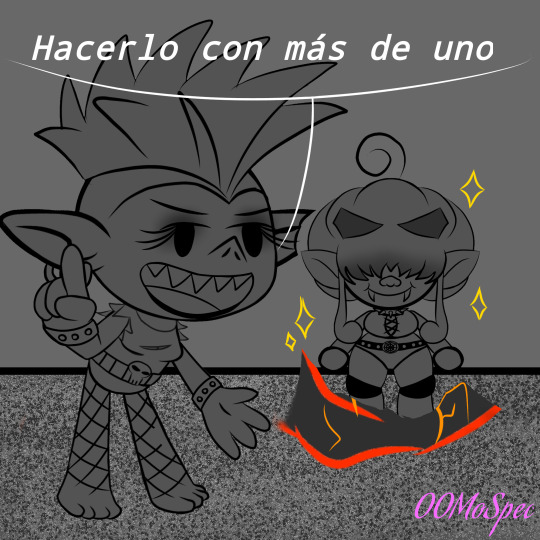
Queen Barb: "Do it with more than one"
Rock Pumkin: *Has hatched*
★Rock Pumkin★

INTRODUCING ROCK PUMKIN, BEAUTIFUL AND KNOWLEDGEABLE PEOPLE. (ノ◕ヮ◕)ノ*.✧.
She's the Rock version of my OC, Pumkin, part of an AU I've been developing in the Trolls AU Community. I haven't talked much about her lore here because I don't think most people would be interested unless they have the same Trolls hyperfixation as me, but hey, I'll see how I do! (≧▽≦).
Anyway, I'm not going to share much lore about this version of Pumkin in this post either, except for what I'm going to translate from the character sheets and some basic explanations. I'll tell the rest of the story in the aforementioned community, but if anyone outside is interested in all that stuff and for whatever reason is bothered by joining the community, feel free to let me know, and I'll happily consider republishing my lore here on the profile!
But anyway, let's get to the translations, I'm sure you'll want to know what the images say!
★Sheet 1 Translation:
*Troll: Rock (Pop)
*Age: 20 years old
*Story: Rock Pumkin is the Rock version of Pumkin. She was supposed to turn into a zombie thanks to the power of the Strings, but…
Queen Barb did something wrong, unleashing a threat far greater than her own World Tour.
Can anyone stop her?
This is part of the Lore that I won't talk much about here. All I'll say is that I have my own Headcannons regarding the Strings and their nature. Like, we know they're the source of music and that they're powerful, but how powerful?
And how well do the leaders know how to use them to their advantage? The Pop Trolls don't know anything, but what about the other tribes? What if the Strings can be used as weapons, but they're NOT supposed to be used as weapons? You know, like something very powerful and exists for good, which is why it's strictly forbidden to use it as a weapon because who knows what would happen then? Which is why, despite knowing their music was in danger, none of the leaders used their respective String's power to prevent something worse.
Except for Barb at the end, and that's what caused everything to go to sh!t when she ended up turning Pumkin into a Rock Troll. Barb's idea was to make a Zombie that would follow her orders, and she may have gotten a little excited with so much power in her hands, which is why, rather than turning Pumkin into a Zombie, she overloaded her with the pure energy of the Rock String, turning her into an unstoppable threat to all the tribes present at the concert, since Pumkin didn't obey any orders, and it was quickly discovered that Rock Pumkin was highly dangerous and hostile.
So this is what Rock Pumkin would look like with her eyes uncovered and his tongue missing, so you can better appreciate her outfit. :D

A little scary, huh? (≧▽≦). Since the eyes turn bright red in the zombification, and since Pumkin isn't exactly a zombie, I thought it would be more fun to make her eyes more sinister, a testament to the Rock Music overload in her.
This is the translation of the second sheet.
★Translation of Sheet 2:
*Physical Differences: Aside from the new outfit, her colors are now darker, with lighter hair. She possesses supernatural strength, speed, and endurance (even for a Rock Troll). She has creepy eyes and a long tongue.
*Mental Differences: Aggressive, brutal, and sadistic. Consumed by a rage not her own (maybe?), she seeks destruction AND PURE CHAOS.
And yes, Rock Pumkin throws all of Barb's plans into disarray in the worst possible way, not to mention the rest of the Trolls present. Luckily, only Pumkin and one other Troll are subject to the power of the Strings.
Who would that other Troll be?
Well, it's probably a bit obvious, but I'm not going to mention it here anyway.
So, that's all. ಡ ͜ ʖ ಡ. I hope you liked it. Thanks for reading!
(References and inspirations used)



#art#dreamworks trolls#original art#pop trolls#trolls oc#oc#pumpkin#queen barb#trolls barb#rock pumkin#pumkin#oc pumkin#trolls world tour#rock trolls
21 notes
·
View notes
Note
Same girl from the last ask! Thank you for answering! You don’t need to answer this one btw, just wanted to share a thought.
I kind of forgot about the ring because he doesn’t show up a lot, but maybe the ring is what causes the time loop? Like when the time comes when she turns, it sends her back as a form of protection or maybe at the end it amplifies Taiga luck and just go “nah, this version of reality is awful let’s jump for the next one buddies”.
Orrrrr maybe, it might be both of things? Like the monster that sealed her fate is very smart and strong, so MC might end up becoming self-aware enough that she can maybe use the ring with a better understanding of how it works.
There is no need for a reply since this has no base at all and I’m just having fun writing this lmao, thanks!!
I think the Kyklos is what causes the time loop, or at least it's heavily interconnected! "Kyklos", if I remember right, means circle or cycle and is actually what some ancient Greeks called cycles of government in society/history! Combine that with that we have the houses of Ultio("venegence") and Clementia("clemency", "mercy"), two goddesses associated with Roman cultural values and the ways that emperors are expected to run their states, both of which are now defunct(one experiencing a death which resulted in a major conflict) and I have much more reason to believe the Kyklos itself ties in to the potential time loops than the ring.
I think the ring is a newer aspect in the cycles(or at least it's changed from previous cycles) to protect the PC--the champion--and to help the ghouls protect her(by buffing their stigmas) and protect everyone against the impending calamity. Maybe in the past she kept dying and since she kept dying(removing the champion from the island) the loop tried to figure out ways to keep her alive.
As for Taiga I think his stigma involves seeing the future, but since we also saw the scene where he said that the outcome Haru was asking him about would differ based on the coin flip, I wonder if he can change it some too(or at least be told the future based on something random like a roll of dice or a coinflip.)
If Taiga can change the future(I believe his line if you lose an arena battle suggests that he can but it's difficult, something to the effect of "it seems like it couldn't be changed easily" compared to his winning line which is more to the effect of "ah, knew that'd happen"--don't quote me on either of those i'm going off of memory lol) or reset the cycle or something similar it'd be interesting if that's why he eas sent after the Kyklos. They expected him to just. . .reset things until he successfully stopped it. But he didn't care to. What's the point when the futures he see are all bad? May as well let it play out on its own. Some tiny spark of hope that things can be changed further down the line rather than at their source--not that it's worked any other time, but he's not dead yet so maybe he sees some hope in it still. . . . Or y'know he doesn't wanna leave Romeo behind to suffer alone lol
The ring is a reference to the ring of Solomon, who made a pact with all of the demons that the ghouls' stigmas' incantations are anagrams of--that'd be a totally different mythological field, but it wouldn't be any surprise for things to overlap. I imagine the ring won't care for her when she turns though--it won't see her as able to save the world or influence the ghouls safely, or perhaps it won't see her as needing protection--and it'll come off or abandon her or something. She won't be herself, she'll no longer be the champion maybe. Or maybe it'll stay on and try and help her or exert some kind of power to get the ghouls to help her. . . .
Definitely a lot of speculation but that's kind of what's fun about it all to me, I agree!! 'u'
16 notes
·
View notes
Note
I'd like to add to this, (for some info, if you haven't seen my stuff before, I'm an academic who has completed her dissertation (and multiple rounds of scientific research), and I have tutored, and taught, undergraduate courses in her scientific field) if you want to do "accurate" research, the above tips are excellent, and I can't argue with them, but I'd like to add a few that I used to tell my students.
In academics we love "primary" sources, that is, stuff written by the researchers themselves, reported by the individuals affected, those who saw the thing (yes, eye-witness testimony!), and the writings of people who saw the thing. Each has different levels of "trust" in terms of how beneficial they can be for research, and it all depends on what you're looking for in terms of specific information.
For instance, knowing how a particular particle acts? We want the stuff written by the researchers, not testimony from the janitor who was on site (even if he was the math-wiz who figured out it would do that *ahem*). On the other hand, knowing a specific person was at a specific event? Usually we have to rely on eye witnesses as there isn't other sources (of course, there could be, film, video, paper records such as signed guest books, etc), but we would classify those a little differently (especially, and this falls into my field as a psychologist, we know how "wonky" [scientific, non-scientific word] memory can be).
To all of these, let me add some specific references that are worth knowing about, as you should be able to find information for most topics in these places:-
Wikipedia. Yes, I know your teachers probably told you "Don't use Wikipedia". What most of them are being bad about communicating with this is that Wikipedia is NOT a "Primary Source". Wikipedia HAS citations, go look those up and verify they are primary sources and use those. The wikipedia article is a good summary of things from the primary sources (in most cases... sometimes it's a bad summary, and in other cases [extremely rarely] it may actually be the primary source, but don't bet on it).
You're local library. Sounds weird to many, but your local library is likely to have access to actual sources of information that you just won't find online (even though it's likely online), because your local librarians are likely to be able to find that 1924 edition of the book you are trying to find some information from, and not give you fifteen different places for people trying to scam you out of money.
Sci-hub. If you don't know what this is, look it up on your non-google search engine of choice. I say avoid google, because google has a competing "product" that google makes money off, and they've been helping crack down on sci-hub for that reason. Also, just don't use google in general because it's gone to shit (this is my personal opinion btw, but I hear it's more common than it used to be *cough* ai results *cough*).
Now, there's also a few things you should absolutely, and utterly avoid if you are trying to find viable information.
ChatGPT. Don't. Just don't. If you don't know why, the short-form of this is ChatGPT is not even a search engine, it "hallucinates" (meaning: It lies about stuff because it doesn't know the difference between a truth and a lie, because it's not actually anything more than a complicated version of your phones predictive keyboard text).
Youtube. While I love watching youtube videos on all sorts of things, and there's some great science communicators who do a lot of good research there... until you know how to "spot the fakes" when it comes to good academic sources, youtube should only be seen as entertainment, not research. Don't trust it unless you know how to verify stuff in the first place.
Any social media "influencer". I'm sure there's a few of them who actually did pass high school educations, and I'm even sure that there's a few who went on to tertiary education and learnt some stuff... but they aren't doing their social media stuff to give you good sources, but to entertain. So... don't trust them.
There's one last entry that is.... well... can be good, can be bad, depends on the circumstances, and that's podcasts on a topic. I've listened to some podcasts that ran for years, that I figured out early on were very loose with the science, but the presented their podcast as if it was all settled science (it was about cults and the psychology of them, and as a psychologist... yeah, they were getting a few obvious things to me wrong), but I also know of podcasts run by people who are actually researchers and very knowledgeable in their field... and they all present on your favourite podcast app of choice as if they are the same thing. I recommend, if you want to use podcasts to help you find information, verify them as being good sources first. For instance, is the podcast about space and advertised on the SETI website? It's likely reasonably accurate. Is it about space and is only found under SUPERAW3S0M3 PODCASTERZZZZ!!! on <podcast app of the day>? It's likely sketchy so I wouldn't trust it. Now, having said that... I wouldn't recommend most of the psychology podcasts you can find off the APA (American Psychological Association, not American Psychiatric Association... *sigh*) website... the APA in recent years hasn't been the champion of science that they claim to be, many of us who are members are rather upset by that in fact.
Also... and here's the bonus "how to find good sources for 'amateur acadamics'", this is a fun one. I know it's relatively easy if you live in the USA, check to see if there is a local "adult education" course near you that is aimed at teaching you proper research methods. The community college I started at (and did teaching and tutoring at once I moved into graduate school), ran six week courses over summer for that, and 12 week courses (once a week, in person and online) during the regular terms. Here in Australia, the TAFE colleges generally have a similar course offering you can take as well. And if you can't find such a course? Remember the "local library" option I mentioned earlier? Yeah, librarians LOVE helping people learn how to find reliable information, and I know there's a lot of smaller libraries that would love to throw on events for things, you never know, you might ask, and they might do a couple of evening "courses" on doing that research.
And wow did I have a "little bit to add" here or what?
Do you have any tips on doing accurate research for people without access to formal education
Sure! This can't be one size fits all for every field, but I can give some starting points for history.
If you're reading a book, here's what to consider:
1. Are there footnotes or endnotes? In academia this is our way of being transparent with each other about where you got information. If a book doesn't have them, they're more interested in telling a good story than being accountable to their peers. That's a red flag.
2. Don't trust claims that seem very specific but don't have a source. Broad claims can be the author's analysis. But specific things "so and so said this" "there was a rumor that (x)" should be coming from somewhere and it is the author's job to tell you where.
3. Look out for choppy quoting. Even if someone has a source, they may not be using it well. If someone is paraphrasing a lot and only uses bits and pieces of the text while also using a lot of ellipses, you will want to try to find the whole text to make sure it's being quoted fairly.
4. Look at the publication date. Knowledge changes with time and old books tend to be outdated. You don't have to stick to the academic rule of thumb of "25 years is the threshold for new scholarship" but do be aware that if something is over 50 years old, many many people have likely revisited and revised what it's saying. Not that new books can't also be bad and incorrect, but they tend to be working with better tools generally.
5. Look up the author. I cannot stress this one enough. The author's background and political convictions can matter a lot to how they interpret things. For example, one of the biographies people tend to pick up about my dissertation topic is from the late 1920s by a man who later applied to join the NSDAP. That fact really can't be separated from his interpretations no matter how hard people try.
6. Stop reading if someone is making a lot of moral or personal judgements on a historical figure. I'm talking about the "Elizabeth I was a frigid hag and men found her ugly"-esque takes, not things like calling historical atrocities morally bad. Does it feel like bitchy gossip? That sort of thing is unprofessional, uninformative, and means someone has an axe to grind. Spite can be motivation for research, but axe grinding shouldn't show up clearly in published work.
These are things to keep in mind to make sure you're getting better information. Others are free to add on for their field or if there's something I forgot.
One very important thing to add: professors and academics like people emailing them about their research. You can do that! You can ask for copies of pay walled articles. You just have to go through the mortifying ordeal of expressing interest in an email.
2K notes
·
View notes
Text
A New Guest
Imagine, Charlie finds a new sinner and takes him to the hotel.
When he settles down, he starts talking to other residents.
Angle: Sooo, how long are you here?
Sinner: About 20-30 years.
Vaggie: Wow! Where were you all this time??
Sinner: I was lurking around. Wasn't that hard, really. Since I died I don't have to eat.
Husk: Hmm... How did you die?
Sinner: On my death bed, surrounded by my loving family.
Niffty: Why are you here?
Sinner: Pardon me?
Niffty: What did you do to come to hell.
Charlie&Angel: NIFFTY!!
Niffty: What? He doesn't sound like a bad boi. Boring.
Sinner: Heh, a little funny actually.. I was a hunter. I used to hunt for living my whole life, until my kids got out to town and bought me there. Gosh, all that new technology! Made me insane
Alastor: I can understand you, my dear new friend.
Sinner: Thanks pal. Anyway, I was hunting one day, and I heard a shuffle and saw some brown fur. I thought it to be a deer, so I shot it.
Sinner: Unfortunately, it was our local radio host. Such shame... I loved his little podcast... I felt so bad for taking his innocent life and devoted mine to help other people...
Alastor: ...
Husk: That's unfortunate buddy. I guess you've got the highest change to actu- OH MY GOD ALASTOR PUT THE GUY DOWN
Vaggie: ALSTOR PUT OUR GUEST DOWN AAAA
Angel: CHARLIE CALL THE SHORT KING ALASTOR HAS GONE ROGUE HE RIPPED THE NEW GUEST APART
#shitpost#hazbin hotel#hazbin hotel lucifer#charlie morningstar#hazbin charlie#niffty#husk#hazbin alastor#hazbin hotel fandom#hazbin hotel alastor#hazbin hotel angel dust#hazbin vaggie#alastor death#for those who don't know#alastor was shot by a hunter#or killed by dogs#not sure actually#different sources have different versions#also he was a radio host (how surprising)#hazbin lucifer#or maybe he got angry that he called him an innocent soul#alastor was a serial killer. innocence#I thought that would be really funny#I mean#the guy killed someone#so he ought to be in hell#and since alastor died a long time ago#the guy might not recognize him as THE radio host#rip#rip new guest
49 notes
·
View notes
Text
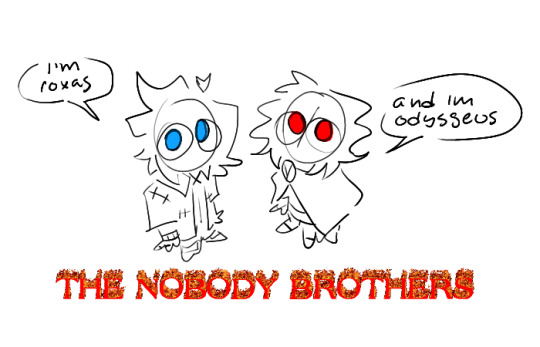
pst. bonus autism version for you autistic odysseus truthers,,,,
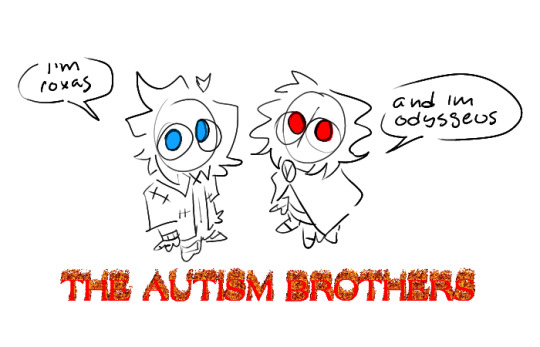
#context for the autism version i was joking w a mutual about ody and roxas both having the autism stare#roxas suffered more than odysseus btw. if you even care#i believe in autistic odysseus like 45% of the time i think#i always believe in adhd odysseus however#(for epic i mean)#audhd odysseus is so true and valid though#anyways roxas is autistic source nomura told me also have you played hit game days#also fellas is it autistic to have a narrative about feeling isolated from the people around you because you are just fundamentally-#-different in a way they cant comprehend at all. so you pretend to be like them. hi roxas is autistic in this essay i will#doodles#shitpost#epic the musical#kingdom hearts#odysseus#roxas
76 notes
·
View notes
Text
An excellent refusal of popularized usage of a clinical term. So we should stop using the word "functioning" incorrectly. Nuance below.
In clinical practice, functioning is defined as "are you able to do the things you need to do to live your life". Everyone's life is different and very individualized. If you never need to have conversations in the presence of more than one other person or other noise, the inability to parse different sound sources does not impede function. But if you want to work as a bartender, you can't take orders, and that prevents you from doing a big portion bartending. But there are accommodations that can make that not a functional issue. If you work in a bar for deaf people, and every speaks using sign language, maybe you'd be fine. Functional bartender again. But if you decide you don't want to be a bartender, you want to make music tiktoks from your room, once again, not a problem anymore. The idea here is that everyone has their own way of functioning, and if your ability changes over time, there are ways to adapt your life to accommodate those changes. Similarly, if your life changes, what defines functioning also adapts to that.
Ideally, each clinician determines what their client needs to do by asking about their lifestyle and where they face challenges. The Client ultimately decides what they need and what their struggles are, and whether they can accept their struggles. And we all struggle. We mostly implicitly accept making typos on these tiny flat smartphone keyboards. But we find it unacceptable to be misgendered. Everyone'a life is different, and their tolerance for struggle is different (in quality and quantity).
Nobody, I reapeat, Nobody is particularly good at identifying where they struggle that without practice. Self-awareness and accurate metacognition isn't something that we constantly engage in, nor is it required to live a satisfying life (apparently). It's not an inevitable process on all levels, but it is something that develops over the lifetime (or not). So yes, of course a random regular person doesn't grasp how difficult this is and take it for granted that their version of normal awareness applies to everyone else. They don't even know what normal awareness is, because they can't know. And yet they're perfectly happy to sling around their criteria that they don't even fit in themselves. They never actually look under the bed (Hi Parasite 2019).
Lastly, what your life is isn't something other people tell you, it's something you identify because you and only you live your own life and have your own experiences. BUT, there are certain boundaries to such freedom of self-determination, and that's when we get to things like laws that prevemt people from harming themselves or other people (or corporations). It's in these systems where we can find issues with what qualifies someone as a whole human being.
And there are certain non-negotiables like hygiene. e.g. Do you need to clean yourself occasionally? yes. Getting sick all the time from weird preventable infections is not good. But it does not have to be a shower everyday! In many contexts, we can definitely expand what constitutes functioning, and that stuff IS just based on social norms and not be written into law or policy. And that's also where education and compassion and an open mind is huge, but provided there are the resources available (i.e. doctors and nurses not being overworked and stressed out all the time helps). But that's not something most regular people ever need to think about, even for themselves.
The idea of functioning in a clinical setting is one thing, but the way we talk about functioning in casual conversation completely mangles the idea.
Functioning pt. 2
The problem with "functioning" as a concept is not the indisputable fact that people have differing abilities, talents, and skills to differing degrees. The problem is that some abilities, talents, and skills are classified as "functioning," and real or perceived deficiency in them is grounds for pathologization and denial of autonomy. I can't play the trumpet, run a marathon, or dance on my toes. These are abilities that some other people have, but I don't. Yet no one is going to call me "low-functioning" or take away my rights because of this. Okay, but those are hobbies, not necessary for survival. If you don't have abilities necessary for survival, surely that's low-functioning. Except I also can't hunt or clean an animal for meat, forage for plants, or spin wool into warm clothing. I would be completely unable to survive without the structures of the society I live in. Yet I still do not face the legal consequences of being classified as "low-functioning." I am not denied human rights for this. Primitivists and fascists insult me for this (I don't care), but they have no legal power over me (yet).
Okay, but those skills aren't necessary for survival in my social context, a post-industrial capitalist society. Lacking abilities that are necessary life skills in my social context, that would definitely get me classified as "low-functioning", right? Except, no, I'm not very good at post-industrial capitalism, either. I can't file my taxes without assistance. I'm hazy on what the stock market is. The complex interconnected computers I use to manage my life might as well be run by tiny elves in hamster wheels for all I understand them. People might make fun of me or look down on me for this. But they don't classify me as "low-functioning." They don't take away my right to make my own decisions about my own body. But I have trouble filtering out different sounds, speech, and background noise. If I'm in a meeting or a crowded room, and people are have multiple conversations at once, I have no idea what's going on. I sometimes get a look on my face that others read as "confused." This is what makes people question my "functioning." Because I "look confused," and they don't think I can think. "Functioning" is not about what skills people have or how well they can survive. It's about how well they can perform normative behavior in their society, and about the assumption that people who do not perform normative behavior are less capable of thinking or decision-making. "But what about people who can't take care of themselves?" Irrelevant. You can't take care of yourself either. You live in a building you didn't construct, powered by electricity you didn't install and probably don't understand, travel in a metal box powered by a combustion engine to get food you didn't grow and products you didn't build in exchange for tokens with no intrinsic value and spend most of your waking hours doing meaningless tasks in exchange for such tokens. You can't conceptualize what it would mean to "take care of yourself" -- no, not even if you have a small garden or a few animals you like to imagine constitutes "self-sufficiency" (it doesn't). Which is fine! Humans are an interdependent species who shouldn't have to "take care of themselves."
But the concept of "functioning" is not based on skill level. It is not based on "how much support someone needs" (which would be meaningless in the first place -- all humans need roughly the same amount of support; the differences arise in who has the social privilege to access it and whose human needs are framed as "special" or "extra"). The concept of "functioning" is based on the unchallenged cultural assumption that people with non-normative traits are less human, less reasonable, less thinking, less capable of decision-making. As I wrote in this previous post, humans do not "function." Humans are not machines. Humans are thinking, feeling, decision-making beings. They do not need to fulfill any "function" in order to justify their existence or prove their ability to think, feel, make decisions. The right to exist, the right to communicate, the right to self-determination, do not depend on anyone's possession of any particular skill set.
#people loooove coopting professional jargon to make themselves sound authoritative in arguments#but they sound so stupid to people who know#but it works because nobody knows everything and often people know about things only through exposure in casual conversation#and so they learn the twisted coopted meaning instead of how it's actually used#which IS how language evolves over time#but i sometimes wish they wouldn't in the interest of clarity
54 notes
·
View notes
Text
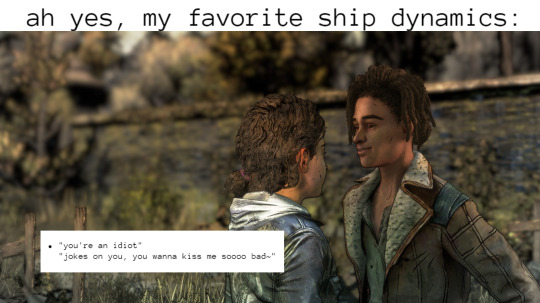
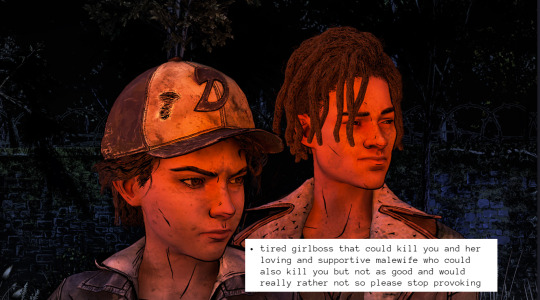


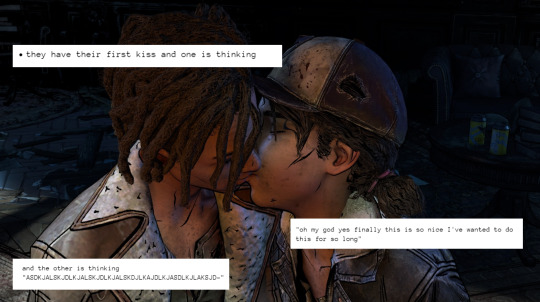
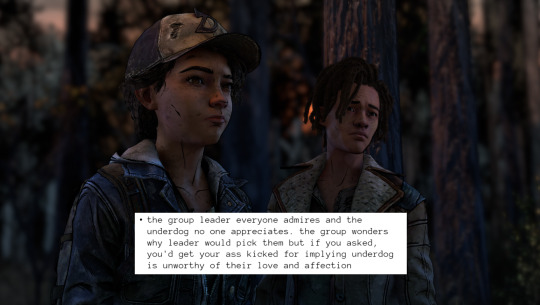
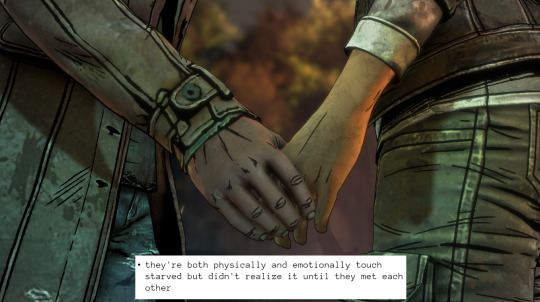
What can I say? They're my favorite.
#twdg#twdg clouis#clouis#twdg clementine#twdg louis#sometimes they creep back into my mind and i'm like 'ah yes' like a crow admiring a pretty stone they found years ago and kept#also thank you pi for the screenshots. i used to have a whole folder full of them but that was when i was doing themed nights#the source for these is me i just have a random document full of dynamics and ship things i enjoy because.....i dunno i like keeping track#and so many of them apply to clouis but there's also an overlap of with clouis and rose/alistair [my warden from origins and alistair] like#alistair's romance route is like an evolved matured and extended version of clouis sksksks gee i wonder if i have a type#look you present me with a character who deflects with humor and isn't taken seriously by the rest of the group and the longer you know the#the more you realize how high they've built a wall around themselves and how *unwell* they really are and how they're not as sunshine#as they present themselves and also they avoid leadership and responsibility until they grow closer with someone who pushes them#and they end stronger and more balanced as a person while finding the affection they've craved#and also there's the daddy issues#present me with that character as a romantic option and i'm in no questions asked okay i don't want the mean broody one that's meh to me#i want the one that has every reason to be broody but chooses not to be because they have a completely different defense mechanism#and a warped sense of themselves and self-esteem issues they leave unaddressed until forced to face them#i'm just saying i'm aware that i have a type i'm always going to gravitate toward clouis nearly checks all the boxes#also the lack of clouis these days? my crops are thirsty and i have too many ongoing projects to do anything about it other than this sksks#so until i make time to finish my long ass louis/clouis analysis this is the best i can provide for now
293 notes
·
View notes
Text
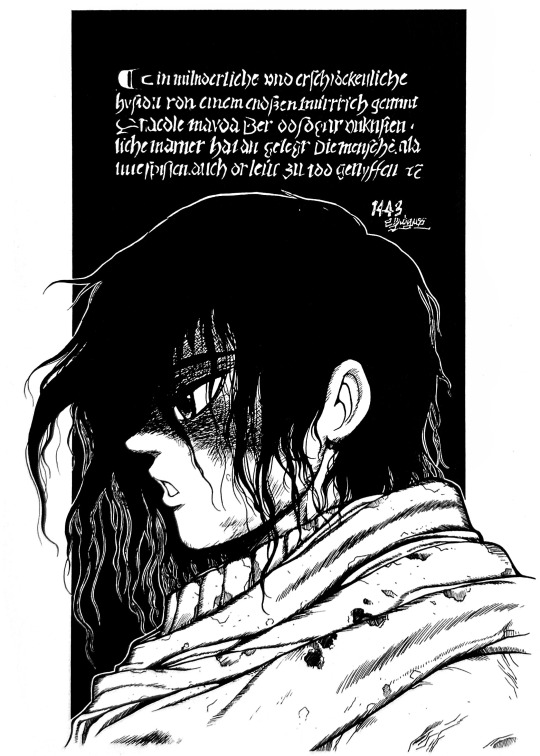
Hellsing 2002 calendar illustration.
Ein wunderliche und erschröckliche Hystori von einem großen Wüttrich genant Dracole wayda Der do so ganz unkristenliche marrter hat angelegt die mensche, als mit spissen als auch die leut zu Tod geslyffen
A wondrous and frightening story about a great berserk called Dracula the voivode who inflicted such unchristian tortures such as with stakes and also dragged people to death
#hellsing#alucard#kouta hirano#translation was found in a comment by u/lazyfoxheart on r/Kurrent#fun fact this is the highest quality version of this image that exists online#i know because i've been looking forever for a version that's clear enough to actually read what hirano wrote under '1443'#but there weren't any so i had to take matters into my own hands#the real image on the back of the guidebook is only 2 inches tall so i had to take this with my smartphone and will my hands not to shake#anyway i'm pretty sure it's supposed to say Eğrigöz (the location vlad was imprisoned) so yeah. thank you hirano very cool#if i might rant for a sec it took me an embarrassingly long time to figure that out because i didn't have the guidebook at first#and in the images i could find online that part was just a blur that looked suspiciously like a person's signature and i was like. who tf#i was thinking matthias corvinus since he issued some political propaganda against vlad iirc but it didn't match his signature on wikipedia#then i thought it might be vlad II dracul's since he probably had to sign an agreement to send his sons over as hostages at some point#but that didnt seem right either so i kept skimming vlad's wiki page#and then i was like goddammit...hirano.....you just misspelled Eğrigöz didn't you.. ....#i maybe should've made a separate post dedicated to this instead of writing a novel in the tags but eh#the hellsing brainrot runs deep#also- i put it in the source link at the bottom of the post but the german inscription is copied off a real woodcut of vlad from 1491#except instead of depicting him as an adult hirano drew him as a child which gives the inscription a very different feel imo#the one final thing that interests me about this is the fact that hirano published this calendar in 2002#which is REALLY early in the series. like this was before volume 5 came out??#i have no idea why he decided to do a massive spoiler drop in a random piece of japan-only merch#sandwiched between a drawing of alucard as john travolta from saturday night fever and integra as a fish no less#it makes me really curious to know what the fan response to this was back then. like did people even know who this was#maybe im just an idiot and everyone back then was like 'ah yes its alucard as a 12 year old. how very informative'
116 notes
·
View notes
Text
Well they caught him. If he wasn't the exact kind of person tumblr loves, the conspiracy theories about this being a random person being framed would have continued to spread. But he's an attractive 26 year old white man who was caught carrying a manifesto about corporate America and has an internet history that matches up with tumblr's general politics. So everyone is going to get excited about how he's a martyr and go back to acknowledging reality in that there isn't a conspiracy to frame the wrong guy.
The discussions over whether or not this man should be lionized as a hero are honestly not as relevant as the comfort with which people are going to drop the conspiracy theory they would have been fully committed to if this man's politics turned out to be nuts. The ease with which the userbase of this website switches between realities based on whether or not they confirm their biases is really alarming. I just hope people understand how weird it is to claim a random person is 100% going to be framed by the FBI on one day, and then drop that by the next day when it becomes clear that the person being "framed" is the exact kind of communist you had hoped.
#gingerswagfreckles#i feel like this comes off as waaah the ceo got shot and i really dont feel that way#i dont care he had it coming#and also. i cannot say yet bc not much info has come out but so far the shooter doesnt seem like someone i dont generally agree with#(preliminarily. maybe the manifesfo is super nuts idk)#but i really think that everyone's excitement to celebrate this guy as a hero is going to#distract from the fact that leftists have like decided conspiracies theories are completely acceptable#and not only that they're fun and true based on nothing but also that they stop being true#when theyre no longer politically beneficial#which just like. do you guys even understand how bad that is. not just that ppl are all gung ho about conspiracies now#but that theyre not dropping them in response to new information that disproves them#but in response to new information that makes them politically inconvenienient to continue to believe#it implies that a huge chunk of leftists are not basing their opinions on reality and facts but whatever makes them feel good and confirms#their identity within their social group. which has been true to some extent for a while#but we are getting to the point where people arent uncomfortable with the cognitive dissonance#that comes with believing in different versions of reality from one moment to the next based on what feels like it would be cool#in that moment#idk we are all doomed i think#i saw this coming back in 2017 and no one listened to me :/ people dont believe in objective truth anymore#they believe truth is something malleable that can be changed to confirm their beliefs#rather than something objective that they should change their beliefs in response to#like why are you all dropping the whole this is a random person being framed thing if you believed that yesterday#like oh ok NOW the police are a reliable source for identifying who the perpetrator is?? bc the perpetrator turned out to be someone you#think is cool?? i do not believe you guys would be believing these same souces arent in on a conspiracy against leftists if this guy#had turned out to be someone you dont like and agree with#luigi mangione#united healthcare#united healthcare ceo#united healthcare ceo assassination
29 notes
·
View notes